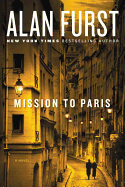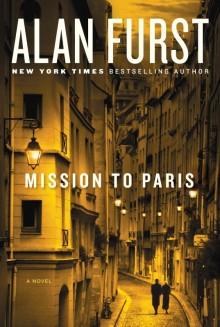
 In 1988, Alan Furst published Night Soldiers, a historical thriller set during the Third Reich's rise to power and the outbreak of the Second World War on the European continent. The latter theme has dominated his fiction ever since, yet with each novel he finds another way to make this familiar history fresh. In Mission to Paris, his 12th pre-World War II novel, Furst introduces us to Frederic Stahl, a Hollywood actor who's been loaned out by his studio to a production company in Paris but quickly gets caught up in much larger dramas.
In 1988, Alan Furst published Night Soldiers, a historical thriller set during the Third Reich's rise to power and the outbreak of the Second World War on the European continent. The latter theme has dominated his fiction ever since, yet with each novel he finds another way to make this familiar history fresh. In Mission to Paris, his 12th pre-World War II novel, Furst introduces us to Frederic Stahl, a Hollywood actor who's been loaned out by his studio to a production company in Paris but quickly gets caught up in much larger dramas.
Stahl arrives in September 1938, as newspaper headlines blare warnings of the state of emergency in Czechoslovakia. As a European emigré (né Franz Stalka of Vienna), Stahl instinctively dislikes the Nazis, and he's caught off-guard by the Reich's efforts to undermine France with a propagandistic "rapprochement" campaign. Furst craftily outlines how a few subtle gestures--a bribe to a well-placed official, a wealthy advertiser complaining about the editorial politics of a leading newspaper, a postcoital suggestion to a radio commentator--contribute to the reshaping of a nation's mood. The Germans want Stahl in their corner, and though at first he's unhesitant to tell them exactly what he thinks of their offer, a conversation with an official at the American embassy compels him to rethink the situation. The Roosevelt administration wants to take on the Nazis, but they lack public support, so they're trying to marshal the intelligence that would convince people the war is worth fighting. "You're not a spy," the diplomatic officer concedes. "That takes nerves of steel, and soon enough becomes a full-time job." On the other hand, "if, in your time here you, ah, stumble on something, something important, it wouldn't be a bad idea if you let me know about it."
One of the consistent strengths of Furst's novels is that, to the casual reader, they seem almost unplotted--from the beginning, things seem to just happen, one after another. This is, however, a finely calibrated effect; Stahl's world is changing around him, and as shifting circumstances converge, the story gradually locks into place. When it does, our sympathetic identification with Stahl is so thoroughly formed that it heightens the dramatic tension that much more. If you've read Furst's previous novels, you'll recognize a familiar face or two along the way. If you haven't, it probably won't be too long before you find yourself searching out his backlist. --Ron Hogan
Shelf Talker: Paris, 1938: What can one Hollywood heartthrob do to help warn the world of the threat posed by Hitler and the Third Reich?

